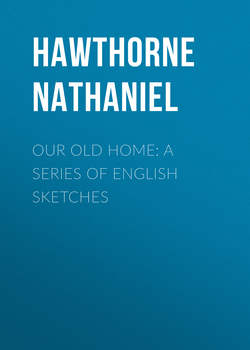Our Old Home: A Series of English Sketches

Реклама. ООО «ЛитРес», ИНН: 7719571260.
Оглавление
Hawthorne Nathaniel. Our Old Home: A Series of English Sketches
CONSULAR EXPERIENCES
LEAMINGTON SPA
ABOUT WARWICK
RECOLLECTIONS OF A GIFTED WOMAN
LICHFIELD AND UTTOXETER
PILGRIMAGE TO OLD BOSTON
NEAR OXFORD
SOME OF THE HAUNTS OF BURNS
A LONDON SUBURB
UP THE THAMES
OUTSIDE GLIMPSES OF ENGLISH POVERTY
CIVIC BANQUETS
Отрывок из книги
The Consulate of the United States, in my day, was located in Washington Buildings (a shabby and smoke-stained edifice of four stories high, thus illustriously named in honor of our national establishment), at the lower corner of Brunswick Street, contiguous to the Gorec Arcade, and in the neighborhood of scone of the oldest docks. This was by no means a polite or elegant portion of England's great commercial city, nor were the apartments of the American official so splendid as to indicate the assumption of much consular pomp on his part. A narrow and ill-lighted staircase gave access to an equally narrow and ill-lighted passageway on the first floor, at the extremity of which, surmounting a door-frame, appeared an exceedingly stiff pictorial representation of the Goose and Gridiron, according to the English idea of those ever-to-be-honored symbols. The staircase and passageway were often thronged, of a morning, with a set of beggarly and piratical-looking scoundrels (I do no wrong to our own countrymen in styling them so, for not one in twenty was a genuine American), purporting to belong to our mercantile marine, and chiefly composed of Liverpool Blackballers and the scum of every maritime nation on earth; such being the seamen by whose assistance we then disputed the navigation of the world with England. These specimens of a most unfortunate class of people were shipwrecked crews in quest of bed, board, and clothing, invalids asking permits for the hospital, bruised and bloody wretches complaining of ill-treatment by their officers, drunkards, desperadoes, vagabonds, and cheats, perplexingly intermingled with an uncertain proportion of reasonably honest men. All of them (save here and there a poor devil of a kidnapped landsman in his shore-going rags) wore red flannel shirts, in which they had sweltered or shivered throughout the voyage, and all required consular assistance in one form or another.
Any respectable visitor, if he could make up his mind to elbow a passage among these sea-monsters, was admitted into an outer office, where he found more of the same species, explaining their respective wants or grievances to the Vice-Consul and clerks, while their shipmates awaited their turn outside the door. Passing through this exterior court, the stranger was ushered into an inner privacy, where sat the Consul himself, ready to give personal attention to such peculiarly difficult and more important cases as might demand the exercise of (what we will courteously suppose to be) his own higher judicial or administrative sagacity.
.....
After these Gulliverian researches, my agreeable acquaintance had fallen under the ban of the Dutch government, and had suffered (this, at least, being matter of fact) nearly two years' imprisonment, with confiscation of a large amount of property, for which Mr. Belmont, our minister at the Hague, had just made a peremptory demand of reimbursement and damages. Meanwhile, since arriving in England on his way to the United States, he had been providentially led to inquire into the circumstances of his birth on shipboard, and had discovered that not himself alone, but another baby, had come into the world during the same voyage of the prolific vessel, and that there were almost irrefragable reasons for believing that these two children had been assigned to the wrong mothers. Many reminiscences of his early days confirmed him in the idea that his nominal parents were aware of the exchange. The family to which he felt authorized to attribute his lineage was that of a nobleman, in the picture-gallery of whose country-seat (whence, if I mistake not, our adventurous friend had just returned) he had discovered a portrait bearing a striking resemblance to himself. As soon as he should have reported the outrageous action of the Dutch government to President Pierce and the Secretary of State, and recovered the confiscated property, he purposed to return to England and establish his claim to the nobleman's title and estate.
I had accepted his Oriental fantasies (which, indeed, to do him justice, have been recorded by scientific societies among the genuine phenomena of natural history), not as matters of indubitable credence, but as allowable specimens of an imaginative traveller's vivid coloring and rich embroidery on the coarse texture and dull neutral tints of truth. The English romance was among the latest communications that he intrusted to my private ear; and as soon as I heard the first chapter, – so wonderfully akin to what I might have wrought out of my own head, not unpractised in such figments, – I began to repent having made myself responsible for the future nobleman's passage homeward in the next Collins steamer. Nevertheless, should his English rent-roll fall a little behindhand, his Dutch claim for a hundred thousand dollars was certainly in the hands of our government, and might at least be valuable to the extent of thirty pounds, which I had engaged to pay on his behalf. But I have reason to fear that his Dutch riches turned out to be Dutch gilt, or fairy gold, and his English country-seat a mere castle in the air, – which I exceedingly regret, for he was a delightful companion and a very gentlemanly man.
.....